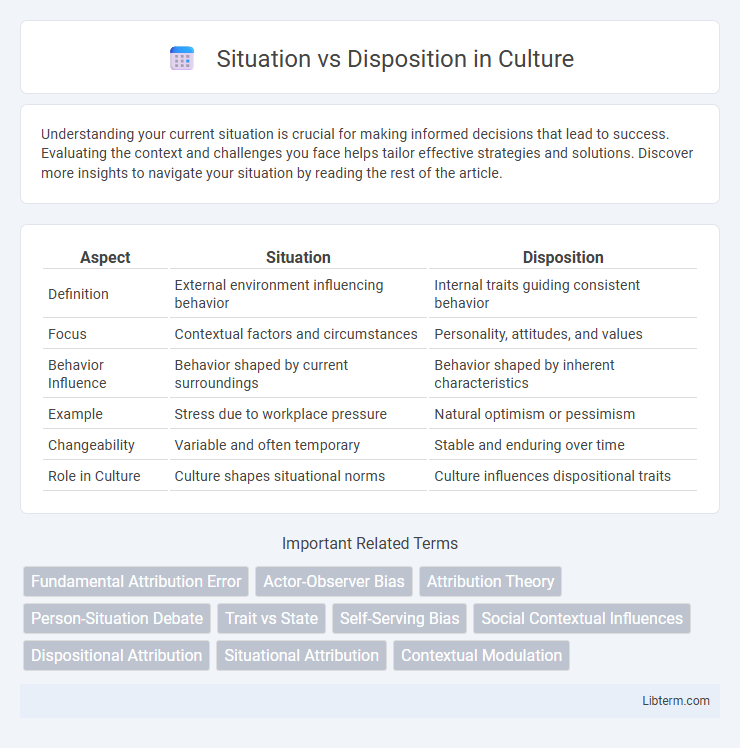Understanding your current situation is crucial for making informed decisions that lead to success. Evaluating the context and challenges you face helps tailor effective strategies and solutions. Discover more insights to navigate your situation by reading the rest of the article.
Table of Comparison
| Aspect | Situation | Disposition |
|---|---|---|
| Definition | External environment influencing behavior | Internal traits guiding consistent behavior |
| Focus | Contextual factors and circumstances | Personality, attitudes, and values |
| Behavior Influence | Behavior shaped by current surroundings | Behavior shaped by inherent characteristics |
| Example | Stress due to workplace pressure | Natural optimism or pessimism |
| Changeability | Variable and often temporary | Stable and enduring over time |
| Role in Culture | Culture shapes situational norms | Culture influences dispositional traits |
Understanding Situation vs Disposition
Understanding situation versus disposition involves distinguishing temporary external factors from enduring internal traits that influence behavior. Situations refer to external circumstances or environmental contexts that can affect a person's actions, while dispositions represent stable personality characteristics or habitual tendencies. Recognizing this difference is crucial in psychology for accurate attribution and predicting behavior.
Defining Situational Factors
Situational factors refer to external conditions and environmental influences that affect individual behavior, such as social context, physical surroundings, and temporal elements. These factors shape actions differently from internal dispositions, which are stable personality traits and tendencies. Understanding situational factors involves analyzing specific circumstances like group dynamics, cultural norms, and immediate stressors that drive behavior in particular contexts.
Exploring Dispositional Traits
Dispositional traits are enduring characteristics that influence an individual's consistent behavior patterns across various situations. Exploring dispositional traits involves examining how innate qualities like extraversion, conscientiousness, or openness to experience shape responses and interactions. Research in personality psychology often contrasts these stable traits with situational factors to understand behavior variability and predictability over time.
Historical Perspectives on Behavior
Historical perspectives on behavior distinguish between situational and dispositional factors in explaining human actions, with early psychology debates emphasizing internal traits versus external environments. Classic studies, such as Kurt Lewin's Field Theory and the Stanford Prison Experiment, highlighted how situational contexts strongly influence behavior, challenging the dominance of dispositional explanations rooted in personality traits. Contemporary research integrates both views, recognizing that behavior results from dynamic interactions between enduring dispositions and momentary situational pressures.
The Role of Culture in Attribution
Cultural context significantly influences the attribution process, where individualistic cultures tend to emphasize dispositional factors, attributing behavior to personality traits, while collectivistic cultures prioritize situational factors, focusing on external circumstances. Research in social psychology highlights that people from Western cultures often exhibit the fundamental attribution error, overestimating internal dispositions over situational influences. Cross-cultural studies demonstrate that understanding cultural frameworks is essential for accurate behavior interpretation and avoiding attribution biases in multicultural settings.
Common Biases: Fundamental Attribution Error
The Fundamental Attribution Error is a common cognitive bias where individuals disproportionately attribute others' behaviors to their personality (disposition) rather than situational factors. This bias leads to misunderstanding the influence of external circumstances and overestimating inherent traits in behavioral analysis. Recognizing this error improves social perception accuracy by balancing the impact of situation and disposition in explanations.
Situation-Driven Examples in Daily Life
Situation-driven behavior in daily life reflects how external circumstances influence actions, such as a usually calm person becoming irritable during a stressful commute. In emergency scenarios, individuals may act heroically despite a generally reserved disposition, highlighting the power of situational factors. Workplace dynamics also demonstrate situation-driven responses, where employees adapt communication styles based on immediate project demands or team pressures.
Disposition-Driven Influences on Actions
Disposition-driven influences on actions stem from enduring personality traits, values, and habitual tendencies that consistently shape an individual's behavior across various situations. These internal characteristics serve as stable predictors of responses, guiding decision-making processes and social interactions regardless of external circumstances. Research in psychology highlights the significant role of dispositional attributes such as conscientiousness, openness, and emotional stability in determining behavioral patterns over time.
Balancing Situational and Dispositional Explanations
Balancing situational and dispositional explanations requires recognizing that behavior often results from an interaction between external environmental factors and internal personality traits. Psychological research, such as attribution theory, highlights how situational influences can override dispositional tendencies in specific contexts, emphasizing the complexity of human behavior analysis. Effective behavioral assessment integrates both situational variables, like social pressure or context, and dispositional characteristics, such as temperament or values, to provide a comprehensive understanding.
Implications for Personal Growth and Relationships
Understanding the distinction between situation and disposition reveals key implications for personal growth and relationships by highlighting how external circumstances versus internal traits shape behavior. A mindset that emphasizes disposition encourages self-awareness and emotional regulation, fostering resilience and deeper connections in interpersonal interactions. Conversely, attributing actions primarily to situational factors may limit accountability and hinder long-term development in both personal and social domains.
Situation Infographic

 libterm.com
libterm.com